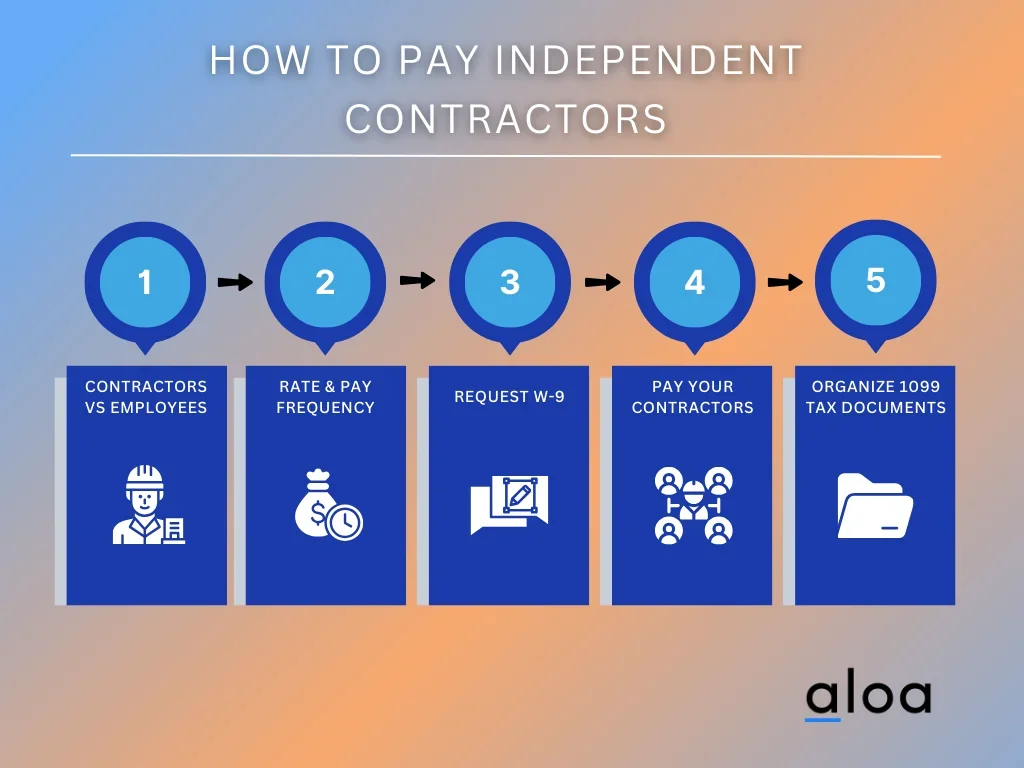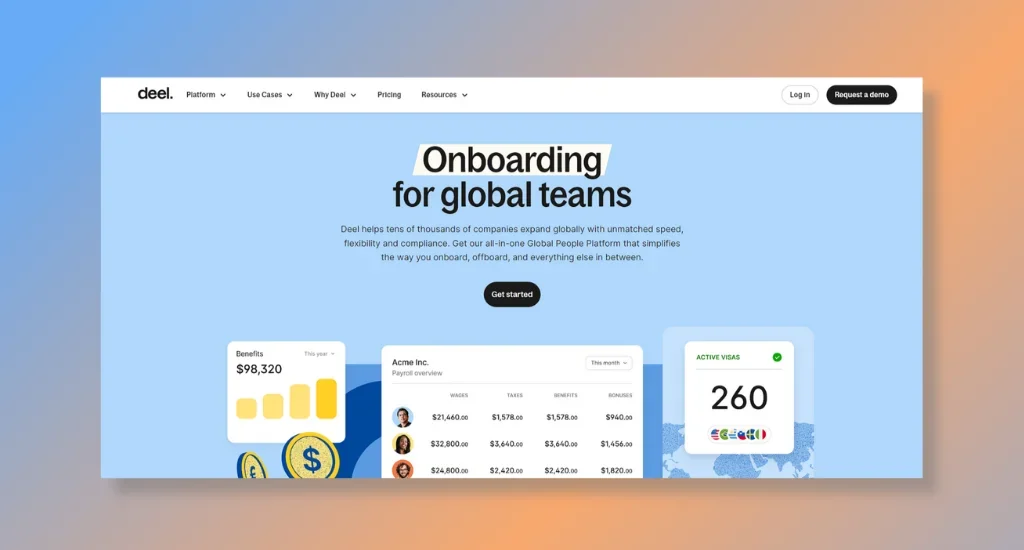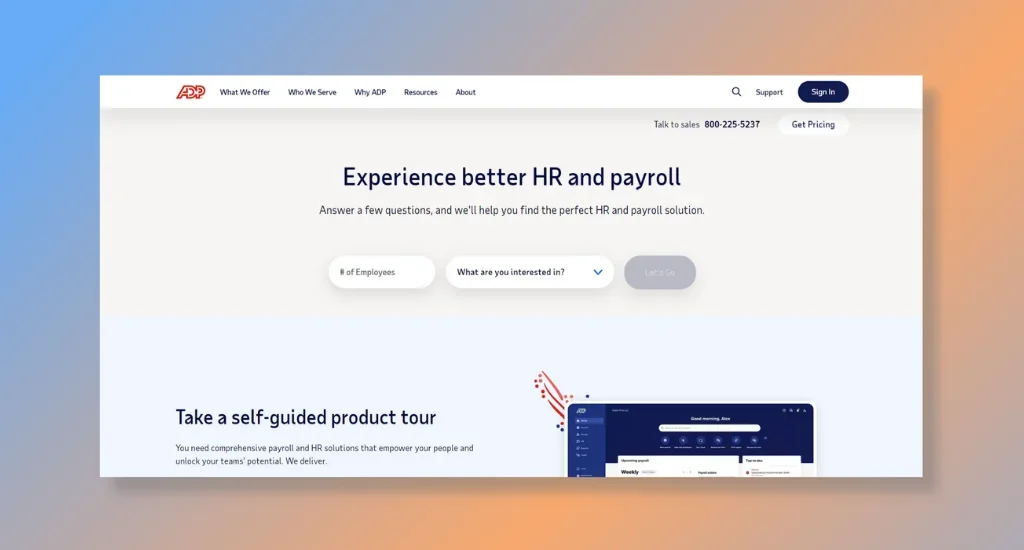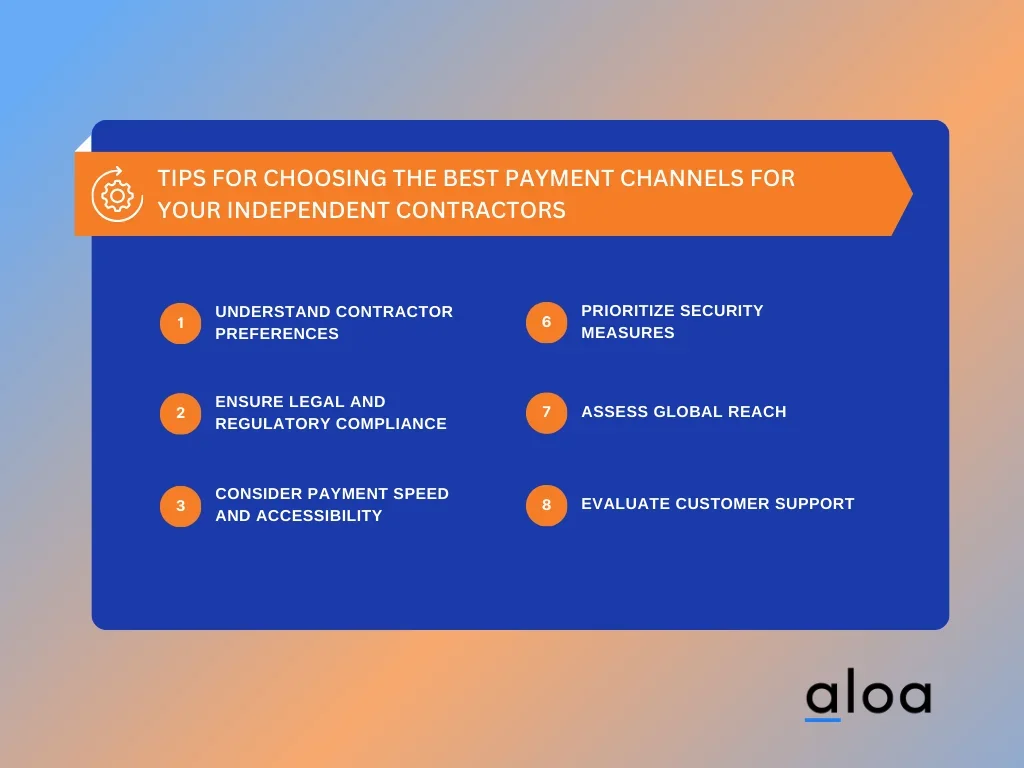In the ever-evolving landscape of freelancing, the dynamics of how to pay independent contractors are pivotal for fostering streamlined payment procedures. As organizations adapt to changing paradigms, the methods of compensating independent talents are witnessing a transformative shift. Technological innovations and digital platforms become instrumental in streamlining payment processes, providing efficient solutions for business owners looking to attract and retain top talent.
Aloa, a leading software outsourcing expert, helps startups and businesses implement the best payment method by finding suitable payment channels. Through their expertise and guidance, they help clients navigate the challenges of how to pay independent contractors, ensuring their business pays their contractors on time while conforming to legal standards.
This article will explore the best payment channels for paying independent contractors and some tips when paying them. From cutting-edge payment technologies to compliance considerations, we will provide valuable insights and practical guidance. After reading, you’ll stay informed compensating independent contractors with lesser convenience fees.
Let’s get started!
How to Pay Independent Contractors
In 2024, the landscape of contractor payments is set to evolve significantly. Staying competitive in refining contractor payment methods is crucial for startup success in managing their workforce. Let's explore the steps on how to pay independent contractors, uncovering key strategies to reshape how startups manage these payments effectively.

Step 1: Differentiate Contractors from Employees
Distinguishing between independent contractors and employees is crucial. Contractors handle project-based tasks temporarily, while employees have ongoing roles. Clearly defining their relationship helps avoid misclassification and ensure legal compliance.
Below are some steps to consider when differentiating them.
- Agreement Documentation: Specify work scope, payment terms, timelines, and requirements in written agreements.
- Record Management: Maintain detailed records to protect both parties and minimize legal risks.
- Financial Planning: Plan for tax forms, track hours, and ensure timely payments for smooth financial transactions.
- Professional Consultation: Consult legal or HR professionals to align with labor laws and industry standards, ensuring compliance and security.
Step 2: Set Payment Rates and Pay Frequency
Setting competitive rates aligned with industry standards and the contractor's expertise is crucial for attracting top talent. Fair and competitive rates entice skilled professionals and demonstrate your commitment to valuing their work.
Additionally, establishing a clear and mutually agreed-upon payment schedule is essential for fostering a positive working relationship. You can avoid misunderstandings and build trust by outlining payment terms upfront and ensuring they align with the contractor's expectations.
Transparent communication about rate changes or payment frequency is also vital for sustaining a harmonious partnership. Keeping contractors informed promptly shows respect for their time and contribution, leading to smoother processes of paying independent contractors and the best way to collaborate with them. Think about choosing general contracting software to streamline processes as well as enhancing efficiency and contractor management.
Step 3: Ask for a Completed W-9 Form
Collecting W-9 forms from contractors is crucial for accurate U.S. tax reporting. The IRS-issued W-9 gathers essential details like name, address, and taxpayer identification number (TIN). Organizing digital copies ensures legal compliance while streamlining processes and maintaining financial transparency.
In addition, meticulous record-keeping is vital for tax purposes and financial documentation. As businesses securely store digital copies in encrypted systems, they safeguard data from unauthorized access and ensure it conforms to regulatory standards governing data privacy. Clear communication about providing resources to contractors also streamline the W-9 submission process, ensuring accurate tax reporting and minimizing potential penalties or discrepancies.
Step 4: Pay Your Contractors
Ensuring a prompt process of paying independent contractors is crucial for nurturing a positive relationship between you and the workers. To assure immediate transactions and enhance financial transparency, choose secure payment methods such as direct deposit or reliable payroll software. You may also confirm payment receipts with contractors to prevent misunderstandings and foster trust in your working relationships.
Here are some factors to consider when paying your contractors:
- Dedication to Fair Practices: Showcase commitment to fair practices and cultivate a reputable image by addressing payment issues promptly.
- Payment Channels and Accuracy: Use payroll services and establish efficient payment channels, including automated systems, to ensure accuracy and timeliness.
- Multiple Payment Options: Provide various payment options to cater to contractor preferences, enhancing convenience for all parties involved.
Step 5: Organize 1099 Tax Documents
One of the crucial aspects for accurate US tax reporting is collecting W-9 forms from contractors. This ensures compliance, streamlined processes, and financial transparency. Precise information on W-9s also facilitates the generation of 1099 forms for comprehensive reporting on various income types.
With meticulous digital record-keeping of 1099 forms, it paves way for efficient tax and financial documentation, ensuring regulatory compliance and efficient reporting. Overall, showing commitment to responsible financial practices, such as adhering to tax laws and regular reviews, fosters trust and credibility with stakeholders, clients, and regulatory bodies.
Top 3 Payment Channels for Independent Contractors
Exploring the most efficient payment channels is essential for businesses seeking streamlined and secure transactions on paying independent contractors. Effective payment channels allow businesses and contractors to avoid huge convenience fees and payment complications. Here are the top 3 payment channels for paying independent contractors:
1. Gusto - Premier Choice for Contractor Payment

Gusto offers a user-friendly platform for over 300,000 businesses, providing an all-in-one solution for HR needs. Gusto simplifies complex HR tasks from streamlined payroll processing, automatic tax filing, and employee benefits to efficient time tracking and hiring tools. The platform also offers insights and integrates seamlessly with other software, ensuring businesses have a comprehensive and efficient HR solution.
With dedicated support and customizable plans, Gusto is a go-to choice for companies aiming to enhance their HR operations, including the ability to automatically generate and file 1099-MISC forms and email them to contractors directly.
Notable Features of Gusto
- HROS Payroll: Gusto offers unlimited payroll runs at no extra charge, state tax registration in all 50 states, and international contractor payments. Through Gusto, eligible businesses may save up to $250,000 using R&D tax credits.
- HROS Benefits: Gusto provides various health benefits. It offers Health Savings Accounts (HSA) and Flexible Spending Accounts (FSA), along with financial benefits like 401(k) retirement savings.
- HROS Time and Attendance: Gusto's features include mobile time tracking with geolocation, overtime alerts, time-off requests and approvals, and PTO policies.
- HROS Hiring and Onboarding: Gusto offers custom onboarding checklists, recruiting software integration, and an applicant tracking system.
- HROS Talent Management: Gusto's features include automated feedback requests, learning tools, and performance review templates.
- HROS Insights and Reporting: Gusto provides access to HR experts, anonymous feedback surveys, automated tax credit identification, and law and regulation alerts.
Gusto Pricing Plans
Considering the diverse needs of businesses, Gusto offers a range of comprehensive plans tailored to different requirements and budgets. Below are the benefits of each plan to help you make an informed decision based on your specific needs.
- Simple Plan: Set at $40 monthly package, plus $6 per person, includes single-state payroll with W-2s and 1099s, health insurance administration, and integrations for account expense management.
- Plus Plan: Priced at $60 per month plus $9 per person (25% off for the first three months), includes all features from the Simple plan, along with multi-state payroll, next-day direct deposit, PTO management, and project tracking like Time Kiosk.
- Premium Plan: With exclusive pricing (details upon contact), this plan includes all features from Plus Plans and adds a Dedicated Customer Success Manager, certified HR experts access, and R&D tax credit discount.
2. Deel - Top Channel for International Payments

Deel simplifies global expansion, streamlining the complexities of invoicing and efficient global workforce payments. It makes its operations for international teams easier with features like equity distribution and compliance tracking. With its user-friendly, transparent, and scalable interface, it provides a comprehensive solution for paying independent contractors from businesses of all sizes.
Notable Features of Deel
- Scale Globally with Ease: Deel’s scaling process allows them to hire contractors worldwide, especially software developers from Eastern Europe, streamlining HR processes for global teams and efficiently paying workers through a consolidated payroll system.
- Run Global Payroll Efficiently: Offers a single self-serve platform for payroll operations spanning 150 countries, encompassing both Deel Global Payroll and Deel US Payroll, demonstrating its capability to process $10 billion in Global Payroll.
- Compliant Onboarding and Contractor Management: Facilitates the global onboarding of contractors while ensuring compliance with local laws and payroll regulations.
- Global Equity Management: Enables users to offer equity compliantly in over 110 countries, simplifying tax reporting and consolidating compensation processes.
- Consolidate HR Operations: Deel HR seamlessly consolidates global employee data into a single Human Resources Information System (HRIS). This ensures compliant localization of all aspects, from onboarding processes to holiday management.
Deel Pricing Plans
Deel offers a range of options designed to meet your global HR and administrative requirements, including:
- EOR (Employer of Record): Provides global employee hiring at a starting cost of $599 per month. Clients receive support from 200+ local HR and legal experts, ensuring the protection of their intellectual property.
- Contractors: Offers management solutions for paying independent contractors, starting at $49 monthly. It includes locally compliant contracts, guidance on local laws, automatic collection of regional tax agreements, and diverse bulk payment options in 150 currencies.
- Global Payroll: For global payroll solutions covering payroll processing and government declarations in 100+ countries, contact the sales team for pricing.
- Deel HR: Provides an automated HR administration and reporting solution for global use, streamlining access to applications like Google Suite, collecting custom documents, and managing expenses, time off, and bonuses.
3. ADP - All-In-One Payment Platform

Trusted by over 1,000,000 clients worldwide, ADP offers a modern, all-in-one platform for managing and paying your independent contractors. Whether you need simple tools or full-service management of outsourced partnerships, ADP ensures expert services.
Additionally, this channel goes beyond payroll with ADP TotalSource®, a full-service PEO providing day-to-day support and ongoing guidance from dedicated HR experts. ADP's payroll consulting services further offer comprehensive support to your business needs.
Notable Features of ADP
- Automated Payroll Processing: Ensures seamless and error-free payroll processing for businesses with 1-49 employees. It also provides the convenience of automatic tax filing and integration with time-tracking and HR systems.
- Flexible Payroll Solutions for Mid- and Large Businesses: Designed for businesses with 50-1,000+ employees, allowing automated employee data syncing and a top-rated mobile app for employees and managers.
- Comprehensive Time & Attendance Management: Empowers businesses to manage labor costs and enhance workforce efficiency with features like labor forecasting and leave case tracking.
- Powerful Employee Benefits Administration: ADP offers robust solutions for streamlined employee benefits administration and aiding talent acquisition. Key benefits encompass retirement plans and group health insurance.
- Professional Employer Organization (PEO) Services: Cater businesses with 5 to 250+ employees. It provides dedicated experts and technology to manage workers' compensation and EPLI.
ADP Pricing Plan
ADP prioritizes client satisfaction through a personalized pricing approach. Prospective clients can avail of free consultation with ADP's experts based on business sizes, specific requirements, and preferences. ADP presents a customized pricing plan perfectly aligned with each business's unique payroll, HR, and compliance needs. To explore a pricing solution tailored for your company, connect with ADP and initiate a consultation on their website.
Tips for Choosing the Best Payment Channels for Your Independent Contractors
When paying independent contractors, selecting the best payment channels is important for clients, streamlining financial transactions and reducing administrative burdens. Contractors can benefit from this by enjoying faster access to funds, minimizing uncertainties, and promoting financial stability in their freelance endeavors. Consider these practical tips:

Understand Contractor Preferences
Understanding contractors' payment method preferences is essential. This approach not only aids in selecting suitable channels but also enhances client and worker satisfaction. Payment frequency and specific requirements are pivotal in fostering trust, reliability, and positive rapport, making it a reasoned and beneficial practice.
Proactively addressing options for paying independent contractors is a critical factor for smoother collaborations and timely deliveries, ultimately contributing to project success. To achieve this, set clear expectations by discussing payment preferences, including the number of contractors and contractors invoice frequency, with contractors. Additionally, maintaining accurate and up-to-date payment information helps avoid delays or issues.
Ensure Legal and Regulatory Compliance
When selecting payment channels for your business, prioritize adherence to tax and labor laws. Partnering with providers who uphold regulatory standards ensures legal compliance, protects business interests, and maintains a trustworthy industry reputation.
Additionally, staying informed about evolving tax laws and regulations about paying independent contractors is critical to avoiding non-compliance issues that could negatively impact your business. Regular audits of your payment processes will also help you promptly identify and rectify any issues, including appropriate deductions and tax obligations.
Consider Payment Speed and Accessibility
Enhancing contractor satisfaction and loyalty requires prioritizing prompt payment processing. Hence, opt for payment channels with convenient transaction options that improve operational efficiency and consider implementing a free online invoice generator to create professional invoices and streamline payment processes in just a click.
Moreover, satisfying payment experiences involve offering accessible methods to pay independent contractors, including wire transfers, which are one of the quickest ways to make funds available. This boosts contractors’ trust in your company, knowing they get paid for their services without experiencing any payment delays.
For EU/EEA-based contractors, using instant SEPA provides real-time Euro payouts that typically land in seconds, 24/7/365, with instant confirmation. This method reduces cross-border friction and fees versus cards or traditional wires, improving cash flow predictability for startups and satisfaction for contractors. It’s especially helpful for urgent or milestone-based payments, where eliminating weekend/holiday delays can keep projects on track.
Prioritize Security Measures
When paying independent contractors, ensuring the security of transactions should be a top priority. Secure payment methods, such as through debit card payments, are crucial in safeguarding contractor payments from potential risks such as fraud and theft.
This strategy helps you protect against financial vulnerabilities and instill confidence in the overall transaction security. Fortifying robust security enhances trust between your business and contractors, upholding confidentiality and safety with your financial transactions.
Assess Global Reach
Global reach is critical in ensuring smooth and reliable payment processing for international contractors. Businesses can optimize their payment systems by understanding the diverse wire transfer options available for global payment transfers, facilitating seamless transactions across different regions.
Such solutions provide added security measures when paying independent contractors, ensuring your chosen payment channel works both on your end. Ultimately, embracing global reach in payment processing is an excellent option for meeting the evolving needs of contractors worldwide and fostering stronger business relationships across borders.
Evaluate Customer Support
In paying independent contractors, having dependable customer support is paramount for resolving issues promptly. Responsive assistance enhances the payment experience, ensuring discrepancies are efficiently addressed. Additionally, trust and reliability are nurtured through having effective support systems, where prompt responses to payment inquiries elevate overall satisfaction levels.
The presence of supportive customer service not only streamlines the payment process but also adds a layer of reliability and efficiency to the entire transaction journey. Businesses must prioritize robust customer support to create a seamless payment experience and build trust with their contractors.
Key Takeaway
Embracing modern payment methods on how to pay independent contractors empowers businesses to streamline financial transactions, optimize budgets, and foster stronger relationships with contractors through timely payments. This shift to digital platforms positions enterprises to thrive in a dynamic business landscape.
However, businesses must recognize that modern payment solutions require collaboration among business owners, finance teams, and individual contractors. This collective effort transforms payment workflows, empowers contractor engagement, and fuels business growth. With a collaborative approach for financial agility and adaptability, startups and businesses can further achieve sustained competitiveness in the financial market.
Want to know more about how to pay independent contractors? Subscribe to Aloa’s email list via the Aloa blog page today. We’ll constantly share insights into efficient payment methods and processes there based on emerging trends in the fintech and payments industry. Our curated content will keep you informed and ahead of the curve, enabling you to leverage technologies for efficient financial transactions and business success!

